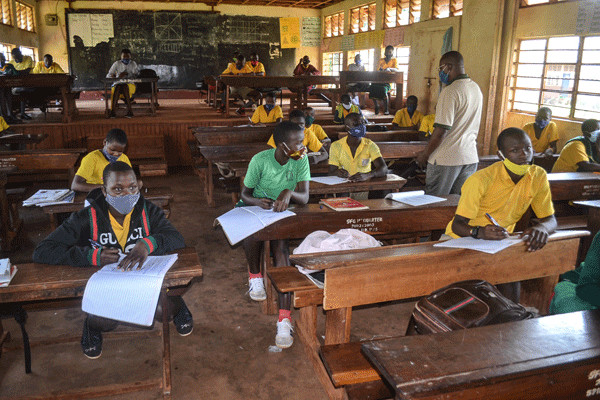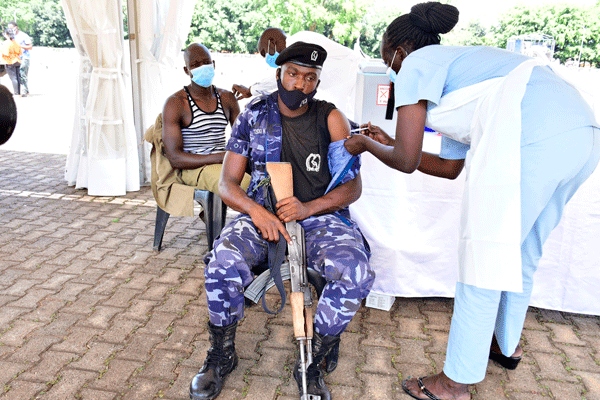Prime
Experts tell Museveni to delay full reopening

Pupils attend classes in Jinja City in early 2021. Schools in Uganda are expected to resume in early January 2022 following a two-year Covid-19 forced break. PHOTO/FILE
What you need to know:
- Members of the National Covid-19 Taskforce say they are concerned by a surge in cases driven by the new Omicron variant, which is believed to be more transmissible.
The National Covid-19 Taskforce has called for a two-week delay in the full reopening of the economy to assess the impact of the new Omicron variant of the coronavirus.
Led by Prime Minister Robinah Nabbanja, the taskforce made the recommendation in a meeting with President Museveni yesterday at his country home in Rwakitura, Kiruhura District.
The President is expected to announce a final position when he addresses the country later this week.Speaking in October to encourage vaccinations, President Museveni vowed to remove all remaining restrictions next month.
“Even if you don’t come out for vaccination, we will open the schools and the economy,” he said. “If anything goes wrong, the moral responsibility is yours.”
But members of the taskforce, who spoke to this publication yesterday night on condition of anonymity in order to speak freely, said they were concerned by a surge in cases driven by the new Omicron variant, which is believed to be more transmissible.
“We watched the numbers increase. We have not yet seen an increase in [hospital] admissions but that doesn’t mean the cases will not increase,” a member of the taskforce said. “The decision for reopening is based on science. We will have to wait for the next two weeks to understand what the pandemic will look like.”
Another member of the taskforce said a surge in case numbers had forced a rethink of the reopening plan.
“The positivity rate was under one percent but right now it is above five percent, which is the red-line. Once the positivity rate goes beyond five percent, it means you are already in trouble,” the official said.
“We are reconsidering the reopening plan because we need to curb the infections. The only thing is that maybe hospitalisation and deaths are not yet high but soon we shall reach there because many people are not yet vaccinated.”
A two-week delay could affect plans to reopen schools which have been closed to learners for most of the past two years.
A dusk-to-dawn curfew imposed in March 2020 has also all but killed off the night economy and destroyed thousands of jobs.
The taskforce recommendations are not final. The decision to reopen the economy and schools lies with the President who is expected to addresses the nation on December 31 at 8pm.
Statistics from the Ministry of Health show that between December 16 and 25, some 6,327 positive cases were detected out of 69,000 samples tested. This was a jump from 754 positive cases out of 54,600 samples detected between December 6 and December 15.
Although early evidence shows the new variant not to be more fatal than previous ones, the ministry reported five Covid-19-related deaths yesterday, the highest in weeks.
Dr Charles Olaro, the director of clinical services at the Ministry of Health, told this reporter yesterday that the emergence of Omicron variant and widespread violation of Covid-19 preventive measures are driving new fears.
“What is known about Omicron is its high transmissibility; what is not yet known is the severity of infection from it,” he said. “But if the number of infections is big then the number of severe cases will also increase.”
Ms Nabbanja said the President will communicate a final decision on the last day of the year. “The resolutions were made but I can’t discuss them because of protocol,” she told this publication by telephone.
Another source on the Taskforce said they want to speed up the roll out of vaccine mandates to limit the spread of the disease after the reopening.
“But even if the vaccination mandates come in, it will be able to minimise but it will not stop the resurgence,” the source said.
Lat Thursday, health minister Dr Jane Aceng told this publications of plans to start implementing vaccine mandates as a means of increasing uptake of the jabs to control the pandemic.
The mandate involves restricting the unvaccinated from accessing offices and public places.
“Cabinet approved our recommendation for vaccination mandate and that we will start implementing next month,” she said. “We are working with the Ministry of Gender, Labour and Social Development and the Office of the Prime Minister to start implementing. Next month we will present the list of institutions and organisations that will be implementing vaccination mandate.”
The minister said 9.1 million Ugandans had received one dose as at the end of last week with 3.4 million fully vaccinated.
The country has so far received 32.6 million vaccine doses, of which 20 million have been dispatched to various vaccination centres.
Coronavirus disease has so far infected 135,091 and killed 3,280 people in Uganda.
Omicron...What we know
What is known about Omicron is its high transmissibility; what is not yet known is the severity of infection from it. But if the number of infections is big then the number of severe cases will also increase,” Dr Charles Olaro, the director of clinical services at the Ministry of Health.




